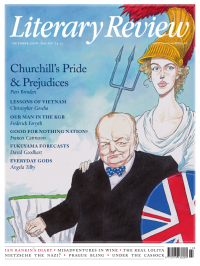Anthony Cummins
A Knight to Remember
Killing Commendatore
By Haruki Murakami (Translated by Philip Gabriel & Ted Goossen)
Harvill Secker 681pp £20
It was recently reported that the authorities in Hong Kong have branded Haruki Murakami’s new novel ‘indecent’, prohibiting its sale to minors. Without wishing to be glib about the concerns of those who see this as a sign of creeping illiberalism in the territory, you don’t have to squint too hard to see where they’re coming from, given that the story ultimately turns on the protagonist’s wet dream about raping his estranged wife, an event that supernaturally makes her pregnant and leads to their eventual reunion (they got together in the first place because she reminded him of his dead sister and her ‘modest breasts’).
One reader’s indecency is another reader’s Nobel Prize candidate. But you seldom feel that Murakami (incidentally or not, a clean-living gent whose extra-literary interests include cooking and long-distance running) is out to titillate or shock. Sex in Murakami serves mostly as a kind of gravitational counterweight to his paranormal storylines, which to and fro metronomically between mundanity and mumbo jumbo. Early in his latest doorstopper (originally published in two volumes in Japanese), the narrator tells a friend he can’t sleep because of what sounds like a bell ringing from under some stones behind his house. On the next page, he’s batch cooking: ‘Once a week I prepare all my meals. I put them in the fridge or freezer, then get by on these for the week. This was my meal-prep day. For dinner that evening I added macaroni to some boiled sausage and cabbage. Plus a tomato, avocado, and onion salad. In the evening I lay on the sofa...’
The friction between these elements, together with the equally matter-of-fact way they’re described, generates an undeniable comic voltage, but you’re never sure how far Murakami is in control of it. Melding the aftershocks of 20th-century conflict with those of private tragedy, Killing Commendatore is essentially a haunted-house tale

Sign Up to our newsletter
Receive free articles, highlights from the archive, news, details of prizes, and much more.@Lit_Review
Follow Literary Review on Twitter
Twitter Feed
The son of a notorious con man, John le Carré turned deception into an art form. Does his archive unmask the author or merely prove how well he learned to disappear?
John Phipps explores.
John Phipps - Approach & Seduction
John Phipps: Approach & Seduction - John le Carré: Tradecraft; Tradecraft: Writers on John le Carré by Federico Varese (ed)
literaryreview.co.uk
Few writers have been so eagerly mythologised as Katherine Mansfield. The short, brilliant life, the doomed love affairs, the sickly genius have together blurred the woman behind the work.
Sophie Oliver looks to Mansfield's stories for answers.
Sophie Oliver - Restless Soul
Sophie Oliver: Restless Soul - Katherine Mansfield: A Hidden Life by Gerri Kimber
literaryreview.co.uk
Literary Review is seeking an editorial intern.